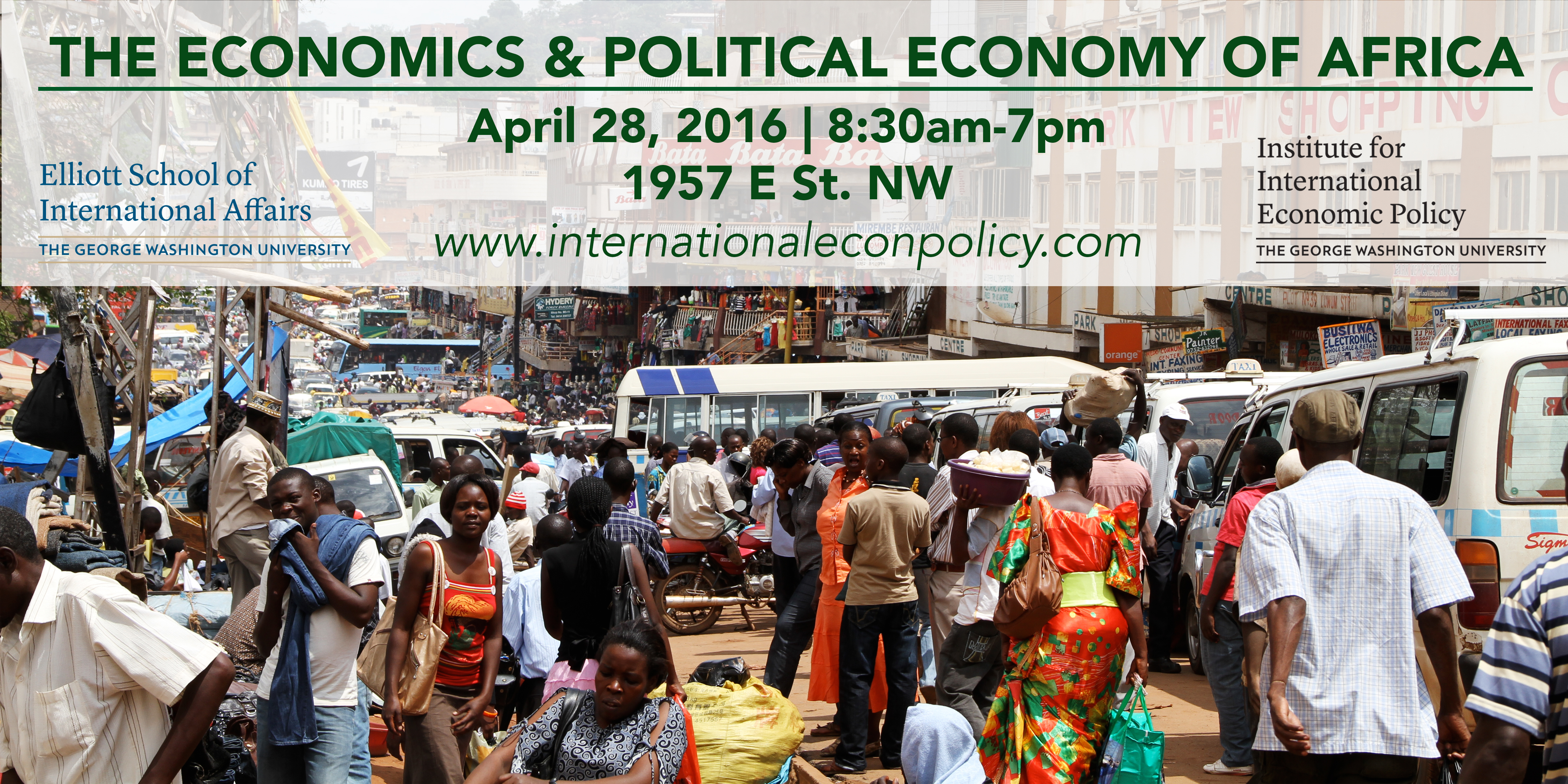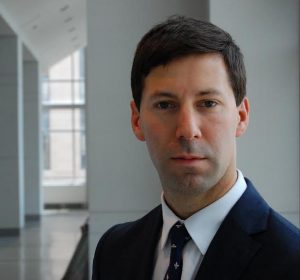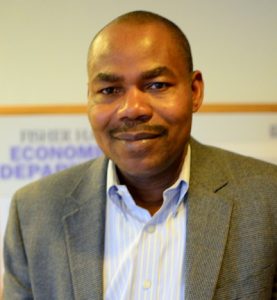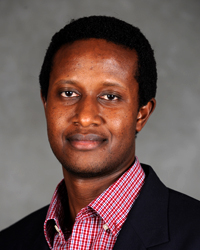Originally published on August 8, 2013
In a 1925 pamphlet “The Economic Consequences of Mr. Churchill,”John Maynard Keynes made a compelling argument against Britain’s rapid return to the gold standard after the Great War, and emphasized the human cost of conservative policies in terms of high unemployment and labor action – predictions that were well borne out by events. The quality of the mind behind the careful arguments commanded respect. Churchill upon receiving a letter from Keynes which said: “Dear Chancellor of the Exchequer, What an imbecile Currency Bill you have introduced!” responded with: “My dear Keynes. Apologies for not writing sooner… I will read your article enclosed and reflect carefully, as I always do, on all you say” (pp 749-50). The adverse consequences of the British austerity policies are carefully documented in a recent IMF World Economic Outlook (pp. 110-2).
With this precedent in mind, I had high expectations for an article entitled “The Economic Consequences of Professor Amartya Sen” by economist Arvind Subramanian, a fellow Washingtonian with an office nearby. I imagined he might analyze and perhaps critique the key policy recommendations in the new book by Jean Drèze and Amartya Sen, An Uncertain Glory: India and Its Contradictions. Or perhaps provide a reasonably engaging account of the many ways that Sen’s research has reoriented development policymaking to focus on human outcomes.
Instead I was left wondering whether the author had read this book or any of Sen’s works at all. In a classic polemical style, Subramanian assigns the name “Redistribution through Rights and Entitlements” or “RRE” to the imagined enemies of the good – the many programs he sees as responsible for busting the Indian budget. He never defines the term RRE, only condemns it, then proceeds to apply it far too liberally. Is redistribution really the only reason a government provides public goods and services? No, there are clear efficiency reasons for doing so, including to sustain long-term economic growth as well as advance human capabilities. In table after table of data, Drèze and Sen document how India has neglected critical investments needed to deliver sustained growth – including basic activities of government like those described by my friend Indira Rajaraman as cited in his article. Subramanian neglects this neglect – and its detrimental effect on long-term growth.
Indeed, Subramanian gives sparse evidence that he understands the broader philosophical issues, including the justification of these investments – that it is not just growth, but rather the quality of growth, and especially its inclusiveness across groups of people and dimensions of wellbeing, that are important and hence what we should be aiming for. Sen’s broader conception of growth and development is now the accepted understanding of diverse economists including Nobel Laureate Jim Heckman at Chicago and Angus Deaton at Princeton. Sen and Drèze laud India’s progress in growth narrowly defined, but then rightly critique the low inclusiveness of that growth in comparison to other countries in the neighborhood. They express a wider concern about the sustainability of that growth if it continues to fall short in inclusivity terms.
Since we are speaking of the economic consequences of Sen, then clearly all of the budget breaking RRE policies like energy subsidies are supported by Drèze and Sen, right? Of course not! Time and again Drèze and Sen rail against fuel subsidies and other giveaways that benefit primarily the richer folks. They provide reasoned assessments about the policies they support and those they don’t. But these clear distinctions are not relevant for Subramanian, who attributes the lot to Sen and company.
Surely the programs supported by Sen must represent a large portion of government expenditures in India, and are directly responsible for the various macroeconomic ills recounted by Subramanian, right? No, the programs supported by Drèze and Sen represent a relatively modest proportion of the budget. Even the Asian Development Bankconcludes that India is way below other countries in terms of public investments and social assistance programs (as a share of GDP), with only half the average level of social protection expenditure as a proportion of GDP across lower middle income countries in Asia. If there has been an increase of 75% in these meager expenditures – which is less than the increase in GDP during the same period – and India is still way below average, then this clearly indicates just how low the original figures were. In addition, the evidence provided of links from ‘Sen policies’ to the macro problems Subramanian raises is, to put it nicely, rather thin. For example, my family in Chennai has seen a proliferation of imported food products in recent years, which begs the question: how much of the food price rise (or other ills) is attributable to the actions of another Washington neighbor (and erstwhile fellow GWU professor) Ben Bernanke? Subramanian is short on causal evidence about the economic consequences of Professor Sen.
If the main arguments on economic consequences fall short, Subramanian’s final reflections display a vivid lack of comprehension of Sen’s work for someone who alleges to have been an admirer. Subramanian struggles with the idea that Sen could support public action to provide cereal directly to families to combat malnutrition, when his work on famines identified terms of trade issues as the cause and not aggregate shortages. Why the difficulty? Isn’t it obvious that malnutrition and famine may have very different proximate causes and hence different solutions? Or that if the cause of a problem is market-based, the solution need not be? Subramanian also finds it difficult to accept that Sen can support freedom on one hand and public action for food on the other. Perhaps a quick read of Sen’s Development as Freedom would remind him of the notion of effective freedom, which is enhanced when a marginally nourished family now has the capability to be sufficiently nourished due to public action. It would also reveal that Sen the academic and Sen the advocate have always been one and the same, and moreover that the quality of the mind behind the careful arguments should command respect.
 Sam Jones is a Research Fellow at UNU-WIDER based in Mozambique, on extended leave from his position as an Associate Professor in the Department of Economics, University of Copenhagen. He is a versatile economist with expertise in microeconomic empirical methods, education, labour markets, development finance (including foreign aid) and policy macroeconomics. Sam’s work has been published in leading journals, such as Journal of Development Economics, World Bank Economic Review, American Journal of Agricultural Economics, Food Policy, Social Science & Medicine, Journal of Economic Inequality, World Development, Journal of Development Studies, African Development Review, and Journal of African Economies. Much of Sam’s academic research has focused on sub-Saharan Africa and he has previously worked extensively in Mozambique, spending over ten years as an advisor in the Ministry of Finance.
Sam Jones is a Research Fellow at UNU-WIDER based in Mozambique, on extended leave from his position as an Associate Professor in the Department of Economics, University of Copenhagen. He is a versatile economist with expertise in microeconomic empirical methods, education, labour markets, development finance (including foreign aid) and policy macroeconomics. Sam’s work has been published in leading journals, such as Journal of Development Economics, World Bank Economic Review, American Journal of Agricultural Economics, Food Policy, Social Science & Medicine, Journal of Economic Inequality, World Development, Journal of Development Studies, African Development Review, and Journal of African Economies. Much of Sam’s academic research has focused on sub-Saharan Africa and he has previously worked extensively in Mozambique, spending over ten years as an advisor in the Ministry of Finance. James Foster is the Oliver T. Carr, Jr. Professor of International Affairs, Professor of Economics, and Co-Director of the Institute for International Economic Policy at the George Washington University. He is also a Research Associate at the Oxford Poverty and Human Development Initiative at Oxford University. Professor Foster’s research focuses on welfare economics — using economic tools to evaluate and enhance the wellbeing of people. His work underlies many well-known social indices including the global Multidimensional Poverty Index (MPI) published annually by the UNDP in the Human Development Report, dozens of national MPIs used to guide domestic policy against poverty, the Women’s Empowerment in Agriculture Index (WEAI) at USAID, the Gross National Happiness Index of Bhutan, the Better Jobs Index of the InterAmerican Development Bank, and the Statistical Performance Index of the World Bank. Prof. Foster received his PhD in Economics from Cornell University and has a Doctorate Honoris Causa from Universidad Autónoma del Estado Hidalgo (Mexico).
James Foster is the Oliver T. Carr, Jr. Professor of International Affairs, Professor of Economics, and Co-Director of the Institute for International Economic Policy at the George Washington University. He is also a Research Associate at the Oxford Poverty and Human Development Initiative at Oxford University. Professor Foster’s research focuses on welfare economics — using economic tools to evaluate and enhance the wellbeing of people. His work underlies many well-known social indices including the global Multidimensional Poverty Index (MPI) published annually by the UNDP in the Human Development Report, dozens of national MPIs used to guide domestic policy against poverty, the Women’s Empowerment in Agriculture Index (WEAI) at USAID, the Gross National Happiness Index of Bhutan, the Better Jobs Index of the InterAmerican Development Bank, and the Statistical Performance Index of the World Bank. Prof. Foster received his PhD in Economics from Cornell University and has a Doctorate Honoris Causa from Universidad Autónoma del Estado Hidalgo (Mexico).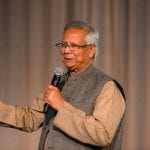





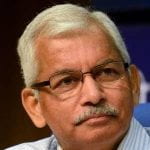








 Jonathan Rothbaum is a research economist in the Social, Economic and Housing Statistics Division of the U.S. Census Bureau. He works on the integration of administrative data into the production of income, resource, and wellbeing statistics. His research has focused on nonresponse, measurement error, and data quality in income surveys and on using surveys to study intergenerational mobility in the United States. Prior to joining the Census Bureau in 2013, Rothbaum received his doctorate in economics from George Washington University.
Jonathan Rothbaum is a research economist in the Social, Economic and Housing Statistics Division of the U.S. Census Bureau. He works on the integration of administrative data into the production of income, resource, and wellbeing statistics. His research has focused on nonresponse, measurement error, and data quality in income surveys and on using surveys to study intergenerational mobility in the United States. Prior to joining the Census Bureau in 2013, Rothbaum received his doctorate in economics from George Washington University.




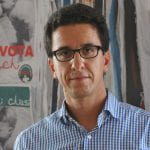










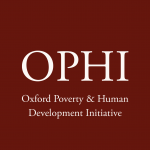









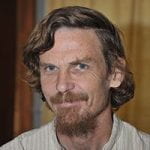







 Sabina Alkire directs the Oxford Poverty and Human Development Initiative (OPHI), a research centre within the Oxford Department of International Development, University of Oxford. Dr Alkire works on a new approach to measuring poverty and well-being that goes beyond the traditional focus on income and growth. This multidimensional approach to measurement includes social goals, such as health, education, nutrition, standard of living and other valuable aspects of life. She devised a new method for measuring multidimensional poverty with her colleague James Foster (OPHI Research Associate and Professor of Economics at George Washington University) that has advantages over other poverty measures and has been adopted by the Mexican Government, the Bhutanese Government in their ‘Gross National Happiness Index’ and the United Nations Development Programme. Dr Alkire has been called upon to provide input and advice to several initiatives seeking to take a broader approach to well-being rather than just economic growth, for example, the Commission on the Measurement of Economic Performance and Social Progress (instigated by President Sarkozy); the United Nations Human Development Programme Human Development Report Office; the European Commission; and the UK’s Department for International Development.
Sabina Alkire directs the Oxford Poverty and Human Development Initiative (OPHI), a research centre within the Oxford Department of International Development, University of Oxford. Dr Alkire works on a new approach to measuring poverty and well-being that goes beyond the traditional focus on income and growth. This multidimensional approach to measurement includes social goals, such as health, education, nutrition, standard of living and other valuable aspects of life. She devised a new method for measuring multidimensional poverty with her colleague James Foster (OPHI Research Associate and Professor of Economics at George Washington University) that has advantages over other poverty measures and has been adopted by the Mexican Government, the Bhutanese Government in their ‘Gross National Happiness Index’ and the United Nations Development Programme. Dr Alkire has been called upon to provide input and advice to several initiatives seeking to take a broader approach to well-being rather than just economic growth, for example, the Commission on the Measurement of Economic Performance and Social Progress (instigated by President Sarkozy); the United Nations Human Development Programme Human Development Report Office; the European Commission; and the UK’s Department for International Development. Ajay Chhibber is Distinguished Visiting Scholar, Institute of International Economic Policy, Elliott School of International Affairs, George Washington University and Non-Resident Senior Fellow, the Atlantic Council, Washington DC. He is Chief Economic Advisor, Federation of Indian Chambers of Commerce and Industry (FICCI). He was earlier the first Director General ( Minister of State) , Independent Evaluation Office, Government of India and Distinguished Visiting Professor at the National Institute of Public Finance and Policy (NIPFP), India – affiliated institute of the Ministry of Finance – where he completed a major study on India’s Public Sector Enterprises. He held senior positions at the UN as Assistant Secretary General and Assistant Administrator, UNDP and managed their program for Asia and the Pacific. At the World Bank he served as Country Director in Turkey and Vietnam and Division Chief for Indonesia and the Pacific and Lead Economist, West Africa Department. He was also Director of the 1997 World Development Report on the Role of the State. He also worked in the World Bank’s Research Department, as Advisor to the Chief Economist of the World Bank and at the Public Economics Division. He has a Ph.D from Stanford University, a Masters from the Delhi School of Economics. He also has attended advanced management programs at the Harvard Business School, Harvard University and INSEAD, France. He taught at Georgetown University and at the University of Delhi. He has published widely including 5 books in development economics, and is a contributor (columnist) to several newspapers. He is now writing a book on “India: A Reset for the 21st Century” under contract with Harper-Collins.
Ajay Chhibber is Distinguished Visiting Scholar, Institute of International Economic Policy, Elliott School of International Affairs, George Washington University and Non-Resident Senior Fellow, the Atlantic Council, Washington DC. He is Chief Economic Advisor, Federation of Indian Chambers of Commerce and Industry (FICCI). He was earlier the first Director General ( Minister of State) , Independent Evaluation Office, Government of India and Distinguished Visiting Professor at the National Institute of Public Finance and Policy (NIPFP), India – affiliated institute of the Ministry of Finance – where he completed a major study on India’s Public Sector Enterprises. He held senior positions at the UN as Assistant Secretary General and Assistant Administrator, UNDP and managed their program for Asia and the Pacific. At the World Bank he served as Country Director in Turkey and Vietnam and Division Chief for Indonesia and the Pacific and Lead Economist, West Africa Department. He was also Director of the 1997 World Development Report on the Role of the State. He also worked in the World Bank’s Research Department, as Advisor to the Chief Economist of the World Bank and at the Public Economics Division. He has a Ph.D from Stanford University, a Masters from the Delhi School of Economics. He also has attended advanced management programs at the Harvard Business School, Harvard University and INSEAD, France. He taught at Georgetown University and at the University of Delhi. He has published widely including 5 books in development economics, and is a contributor (columnist) to several newspapers. He is now writing a book on “India: A Reset for the 21st Century” under contract with Harper-Collins. Monica Pinilla-Roncancio is a Physiotherapist with a Master’s degree in Economics from Universidad del Rosario. She has also a Master’s degree in Health Economics, Policy and Law from Erasmus University Rotterdam, Netherlands. She finished her PhD in Social Policy at the University of Birmingham, UK. From 2016 to 2018 she was as a Postdoctoral Researcher at Universidad de los Andes and currently is an Assistant Professor at the same university. She is the Co-director of Metrics and Policy at OPHI and has been working in OPHI since 2014. She coordinates the work in Latin America, East Asia and some countries in Africa and Middle East. Her main research interest are disability, multidimensional poverty, inequality and health economics.
Monica Pinilla-Roncancio is a Physiotherapist with a Master’s degree in Economics from Universidad del Rosario. She has also a Master’s degree in Health Economics, Policy and Law from Erasmus University Rotterdam, Netherlands. She finished her PhD in Social Policy at the University of Birmingham, UK. From 2016 to 2018 she was as a Postdoctoral Researcher at Universidad de los Andes and currently is an Assistant Professor at the same university. She is the Co-director of Metrics and Policy at OPHI and has been working in OPHI since 2014. She coordinates the work in Latin America, East Asia and some countries in Africa and Middle East. Her main research interest are disability, multidimensional poverty, inequality and health economics. Frances Stewart was Director of ODID from 1993-2003 and Director of the Centre for Research on Inequality, Human Security and Ethnicity (CRISE) at the department between 2003 and 2010. She has a DPhil from the University of Oxford and an honorary doctorate from the University of Sussex. Among many publications, she is coauthor of UNICEF’s influential study, Adjustment with a Human Face (OUP 1987); War and Underdevelopment (OUP 2001); and leading author and editor of Horizontal Inequalities and Conflict: Understanding Group Violence in Multiethnic Societies (Palgrave, 2008). She has directed a number of major research programmes including several financed by the UK Government’s Department for International Development, and others by the Swedish Development Agency and the Carnegie Corporation. An Emeritus Fellow of Somerville College, Oxford, Frances has acted as consultant for early Human Development Reports; she has been President of the Human Development and Capability Association; President of the British and Irish Development Studies Association; Chair of the United Nations Committee on Development Policy and Vice-Chair of the Board of the International Food Policy Research Institute. She received the Leontief prize in 2013 for advancing the frontiers of economic thought from Tufts University. She was given the UNDP’s Mahbub ul Haq award for her lifetime’s achievements in promoting human development in 2009; and named one of fifty outstanding technological leaders for 2003 by Scientific American (Policy Leader in Economic Development Strategies for promoting anti-poverty campaigns to help quell armed conflicts in developing countries).
Frances Stewart was Director of ODID from 1993-2003 and Director of the Centre for Research on Inequality, Human Security and Ethnicity (CRISE) at the department between 2003 and 2010. She has a DPhil from the University of Oxford and an honorary doctorate from the University of Sussex. Among many publications, she is coauthor of UNICEF’s influential study, Adjustment with a Human Face (OUP 1987); War and Underdevelopment (OUP 2001); and leading author and editor of Horizontal Inequalities and Conflict: Understanding Group Violence in Multiethnic Societies (Palgrave, 2008). She has directed a number of major research programmes including several financed by the UK Government’s Department for International Development, and others by the Swedish Development Agency and the Carnegie Corporation. An Emeritus Fellow of Somerville College, Oxford, Frances has acted as consultant for early Human Development Reports; she has been President of the Human Development and Capability Association; President of the British and Irish Development Studies Association; Chair of the United Nations Committee on Development Policy and Vice-Chair of the Board of the International Food Policy Research Institute. She received the Leontief prize in 2013 for advancing the frontiers of economic thought from Tufts University. She was given the UNDP’s Mahbub ul Haq award for her lifetime’s achievements in promoting human development in 2009; and named one of fifty outstanding technological leaders for 2003 by Scientific American (Policy Leader in Economic Development Strategies for promoting anti-poverty campaigns to help quell armed conflicts in developing countries). Ricardo Nogales is a Research Officer at OPHI since May 2018. He holds a BSc. and a MSc. In Economics and a PhD in Econometrics, all from the University of Geneva (Switzerland). Before joining OPHI, he was a Professor of Economics at the School of Economics and Finance of the Universidad Privada Boliviana in Bolivia and a Research Assistant at the United Nations Research Institute for Social Development (UNRISD) in Switzerland. He carried on research activities in the field of development economics, poverty reduction and human development with the IDB, UNDP, ILO, World Bank, Oxfam and IDRC. He has been an external consultant for several public organizations in Bolivia, including the Program for Strategic Research, the Central Bank, the Institute for Agricultural Insurance and the Ministry of Economics and Public Finance.
Ricardo Nogales is a Research Officer at OPHI since May 2018. He holds a BSc. and a MSc. In Economics and a PhD in Econometrics, all from the University of Geneva (Switzerland). Before joining OPHI, he was a Professor of Economics at the School of Economics and Finance of the Universidad Privada Boliviana in Bolivia and a Research Assistant at the United Nations Research Institute for Social Development (UNRISD) in Switzerland. He carried on research activities in the field of development economics, poverty reduction and human development with the IDB, UNDP, ILO, World Bank, Oxfam and IDRC. He has been an external consultant for several public organizations in Bolivia, including the Program for Strategic Research, the Central Bank, the Institute for Agricultural Insurance and the Ministry of Economics and Public Finance. Dean Jolliffe is a Lead Economist in the Development Data Group of the World Bank and member of the LSMS-ISA team. He has extensive experience in the design and implementation of household surveys and is currently managing ongoing LSMS-ISA work in Ethiopia. He has also worked in the South Asia region at the Bank on poverty assessments for Afghanistan, Bangladesh and Nepal. Previously, he was a Research Economist at the Economic Research Service of USDA, an Adjunct Professor at the Johns Hopkins University School of Advanced International Studies, an Assistant Professor at the Center for Economic Research and Graduate Education in Prague, and a Post-doctoral Fellow at the International Food Policy Research Institute. Dean holds appointments as a Research Fellow with the Institute for the Study of Labor in Bonn, and as a Research Affiliate with the National Poverty Center at the University of Michigan. He received his Ph.D. in economics from Princeton University.
Dean Jolliffe is a Lead Economist in the Development Data Group of the World Bank and member of the LSMS-ISA team. He has extensive experience in the design and implementation of household surveys and is currently managing ongoing LSMS-ISA work in Ethiopia. He has also worked in the South Asia region at the Bank on poverty assessments for Afghanistan, Bangladesh and Nepal. Previously, he was a Research Economist at the Economic Research Service of USDA, an Adjunct Professor at the Johns Hopkins University School of Advanced International Studies, an Assistant Professor at the Center for Economic Research and Graduate Education in Prague, and a Post-doctoral Fellow at the International Food Policy Research Institute. Dean holds appointments as a Research Fellow with the Institute for the Study of Labor in Bonn, and as a Research Affiliate with the National Poverty Center at the University of Michigan. He received his Ph.D. in economics from Princeton University. James Foster is the Oliver T. Carr, Jr. Professor of International Affairs, Professor of Economics, and Co-Director of the Institute for International Economic Policy at the George Washington University. He is also a Research Associate at the Oxford Poverty and Human Development Initiative at Oxford University. Professor Foster’s research focuses on welfare economics — using economic tools to evaluate and enhance the wellbeing of people. His work underlies many well-known social indices including the global Multidimensional Poverty Index (MPI) published annually by the UNDP in the Human Development Report, dozens of national MPIs used to guide domestic policy against poverty, the Women’s Empowerment in Agriculture Index (WEAI) at USAID, the Gross National Happiness Index of Bhutan, the Better Jobs Index of the InterAmerican Development Bank, and the Statistical Performance Index of the World Bank. Prof. Foster received his PhD in Economics from Cornell University and has a Doctorate Honoris Causa from Universidad Autónoma del Estado Hidalgo (Mexico).
James Foster is the Oliver T. Carr, Jr. Professor of International Affairs, Professor of Economics, and Co-Director of the Institute for International Economic Policy at the George Washington University. He is also a Research Associate at the Oxford Poverty and Human Development Initiative at Oxford University. Professor Foster’s research focuses on welfare economics — using economic tools to evaluate and enhance the wellbeing of people. His work underlies many well-known social indices including the global Multidimensional Poverty Index (MPI) published annually by the UNDP in the Human Development Report, dozens of national MPIs used to guide domestic policy against poverty, the Women’s Empowerment in Agriculture Index (WEAI) at USAID, the Gross National Happiness Index of Bhutan, the Better Jobs Index of the InterAmerican Development Bank, and the Statistical Performance Index of the World Bank. Prof. Foster received his PhD in Economics from Cornell University and has a Doctorate Honoris Causa from Universidad Autónoma del Estado Hidalgo (Mexico).
 Maggie Chen is Professor of Economics and International Affairs at George Washington University. She has served as Director of GW’s Institute for International Economic Policy and worked as an economist in the research department of the World Bank and a consultant for the World Bank, the International Finance Corporation, the Inter-American Development Bank, and the U.S. Congressional Budget Office. Professor Chen’s research areas include multinational firms, international trade, and regional trade agreements. Her work has been published in academic journals such as the Review of Economics and Statistics, American Economic Journal: Applied Economics, American Economic Journal: Economic Policy, Journal of International Economics, and Journal of Development Economics. She is a co-editor of Economic Inquiry and an associate editor of Economic Modeling.
Maggie Chen is Professor of Economics and International Affairs at George Washington University. She has served as Director of GW’s Institute for International Economic Policy and worked as an economist in the research department of the World Bank and a consultant for the World Bank, the International Finance Corporation, the Inter-American Development Bank, and the U.S. Congressional Budget Office. Professor Chen’s research areas include multinational firms, international trade, and regional trade agreements. Her work has been published in academic journals such as the Review of Economics and Statistics, American Economic Journal: Applied Economics, American Economic Journal: Economic Policy, Journal of International Economics, and Journal of Development Economics. She is a co-editor of Economic Inquiry and an associate editor of Economic Modeling.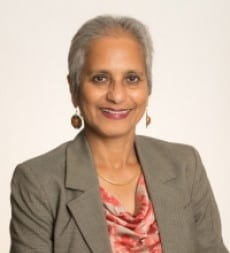 Deepa Ollapally is a political scientist specializing in Indian foreign policy, India-China relations, and Asian regional and maritime security. She is Research Professor of International Affairs and the Associate Director of the Sigur Center. She also directs the Rising Powers Initiative, a major research program that tracks and analyzes foreign policy debates in aspiring powers of Asia and Eurasia. Dr. Ollapally is currently working on a funded book, Big Power Competition for Influence in the Indian Ocean Region, which assesses the shifting patterns of geopolitical influence by major powers in the region since 2005 and the drivers of these changes. She is the author of five books including Worldviews of Aspiring Powers (Oxford, 2012) and The Politics of Extremism in South Asia (Cambridge, 2008). Her most recent books are two edited volumes, Energy Security in Asia and Eurasia (Routledge, 2017), and Nuclear Debates in Asia: The Role of Geopolitics and Domestic Processes (Rowman & Littlefield, 2016). Dr. Ollapally has received grants from the Carnegie Corporation, MacArthur Foundation, Smith Richardson Foundation, Ford Foundation, the Rockefeller Foundation, and the Asia Foundation for projects related to India and Asia. Previously, she was Associate Professor at Swarthmore College and has been a Visiting Professor at Kings College, London and at Columbia University. Dr. Ollapally also held senior positions in the policy world including the US Institute of Peace, Washington DC and the National Institute of Advanced Studies, Bangalore, India. She is a frequent commentator in the media, including appearances on CNN, BBC, CBS, Diane Rehm Show and Reuters TV. She holds a Ph.D. in Political Science from Columbia University.
Deepa Ollapally is a political scientist specializing in Indian foreign policy, India-China relations, and Asian regional and maritime security. She is Research Professor of International Affairs and the Associate Director of the Sigur Center. She also directs the Rising Powers Initiative, a major research program that tracks and analyzes foreign policy debates in aspiring powers of Asia and Eurasia. Dr. Ollapally is currently working on a funded book, Big Power Competition for Influence in the Indian Ocean Region, which assesses the shifting patterns of geopolitical influence by major powers in the region since 2005 and the drivers of these changes. She is the author of five books including Worldviews of Aspiring Powers (Oxford, 2012) and The Politics of Extremism in South Asia (Cambridge, 2008). Her most recent books are two edited volumes, Energy Security in Asia and Eurasia (Routledge, 2017), and Nuclear Debates in Asia: The Role of Geopolitics and Domestic Processes (Rowman & Littlefield, 2016). Dr. Ollapally has received grants from the Carnegie Corporation, MacArthur Foundation, Smith Richardson Foundation, Ford Foundation, the Rockefeller Foundation, and the Asia Foundation for projects related to India and Asia. Previously, she was Associate Professor at Swarthmore College and has been a Visiting Professor at Kings College, London and at Columbia University. Dr. Ollapally also held senior positions in the policy world including the US Institute of Peace, Washington DC and the National Institute of Advanced Studies, Bangalore, India. She is a frequent commentator in the media, including appearances on CNN, BBC, CBS, Diane Rehm Show and Reuters TV. She holds a Ph.D. in Political Science from Columbia University. Jennifer G. Cooke is director of the Institute for African Studies at The George Washington University Elliott School of International Affairs. The Institute serves as central for research, scholarly discussion, and debate on issues relevant to Africa. She is a professor of practice in international affairs, teaching courses on U.S. Policy Toward Africa and Transnational Security Threats in Africa. Cooke joined George Washington University in August 2018, after 18 years as director of the Africa Program at the Center for Strategic and International Studies (CSIS), where she led research and analysis on political, economic, and security dynamics in Africa. While at CSIS, Cooke directed projects on a wide range of African issues, including on violent extremist organizations in the Sahel and Lake Chad Basin, China’s growing role in Africa, democracy and elections in Nigeria, religion and state authority in Africa, “stress-testing” state stability in Africa, Africa’s changing energy landscape, and more. She is a frequent writer and lecturer on U.S.-Africa policy and has provided briefing, commentary, and testimony to the media, US Congress, AFRICOM leadership and the U.S. military. She has traveled widely in Africa and has been an election observer in Sierra Leone, Ghana, Liberia, Mali, and Nigeria. As a teenager, she lived in Cote d’Ivoire and the Central African Republic. She holds an M.A. in African studies and international economics from the Johns Hopkins University School of Advanced International Studies (SAIS) and a B.A. in government, magna cum laude, from Harvard University.
Jennifer G. Cooke is director of the Institute for African Studies at The George Washington University Elliott School of International Affairs. The Institute serves as central for research, scholarly discussion, and debate on issues relevant to Africa. She is a professor of practice in international affairs, teaching courses on U.S. Policy Toward Africa and Transnational Security Threats in Africa. Cooke joined George Washington University in August 2018, after 18 years as director of the Africa Program at the Center for Strategic and International Studies (CSIS), where she led research and analysis on political, economic, and security dynamics in Africa. While at CSIS, Cooke directed projects on a wide range of African issues, including on violent extremist organizations in the Sahel and Lake Chad Basin, China’s growing role in Africa, democracy and elections in Nigeria, religion and state authority in Africa, “stress-testing” state stability in Africa, Africa’s changing energy landscape, and more. She is a frequent writer and lecturer on U.S.-Africa policy and has provided briefing, commentary, and testimony to the media, US Congress, AFRICOM leadership and the U.S. military. She has traveled widely in Africa and has been an election observer in Sierra Leone, Ghana, Liberia, Mali, and Nigeria. As a teenager, she lived in Cote d’Ivoire and the Central African Republic. She holds an M.A. in African studies and international economics from the Johns Hopkins University School of Advanced International Studies (SAIS) and a B.A. in government, magna cum laude, from Harvard University. Andrew Tiffin is a senior economist at the IMF, working in the regional studies division of the Fund’s African Department. He is also keenly involved in the effort to incorporate artificial intelligence/machine-learning techniques into the standard analytical toolkit of the Fund. Previously, he has worked on Middle Eastern countries, with a particular interest in refugee issues in Jordan and Lebanon, as well as numerous countries in Europe–he was part of the Italy team during the debt crisis of 2012, and part of the Russia team for the global financial crisis of 2008. Raised in Sydney, Andrew is an Australian national. He received his post-graduate training at Princeton University, where he obtained both a Ph.D. in economics and an M.P.A. in international relations. In addition to his work with the Fund, Andrew has held positions at the Reserve Bank of Australia, and with the Australian Government.
Andrew Tiffin is a senior economist at the IMF, working in the regional studies division of the Fund’s African Department. He is also keenly involved in the effort to incorporate artificial intelligence/machine-learning techniques into the standard analytical toolkit of the Fund. Previously, he has worked on Middle Eastern countries, with a particular interest in refugee issues in Jordan and Lebanon, as well as numerous countries in Europe–he was part of the Italy team during the debt crisis of 2012, and part of the Russia team for the global financial crisis of 2008. Raised in Sydney, Andrew is an Australian national. He received his post-graduate training at Princeton University, where he obtained both a Ph.D. in economics and an M.P.A. in international relations. In addition to his work with the Fund, Andrew has held positions at the Reserve Bank of Australia, and with the Australian Government. Louise Fox is an experienced development economist who specializes in strategies for employment creation, opportunity expansion, economic empowerment, and poverty reduction. She has advised governments in the developed and developing world, international organizations, and philanthropic and non-profit organizations on problem diagnosis, strategies for results, and outcome measurement. She held full-time positions at USAID (as Chief Economist) and at the World Bank. She is currently affiliated with the African Growth Initiative at the Brookings Institution and the Blum Center for Developing Economies, University of California, Berkeley. She was previously affiliated with the Overseas Development Institute, where she led a major research project. Louise has published in the areas of inclusive growth, structural transformation, youth employment, the political economy of poverty reduction, gender and women’s economic empowerment, employment, labor markets, and labor regulation, pension reform, reform of child welfare systems, social protection, effective public expenditures in the social sectors, and female-headed households and child welfare. Her most recent book was Youth Employment in Sub-Saharan Africa, published by the World Bank in 2014.
Louise Fox is an experienced development economist who specializes in strategies for employment creation, opportunity expansion, economic empowerment, and poverty reduction. She has advised governments in the developed and developing world, international organizations, and philanthropic and non-profit organizations on problem diagnosis, strategies for results, and outcome measurement. She held full-time positions at USAID (as Chief Economist) and at the World Bank. She is currently affiliated with the African Growth Initiative at the Brookings Institution and the Blum Center for Developing Economies, University of California, Berkeley. She was previously affiliated with the Overseas Development Institute, where she led a major research project. Louise has published in the areas of inclusive growth, structural transformation, youth employment, the political economy of poverty reduction, gender and women’s economic empowerment, employment, labor markets, and labor regulation, pension reform, reform of child welfare systems, social protection, effective public expenditures in the social sectors, and female-headed households and child welfare. Her most recent book was Youth Employment in Sub-Saharan Africa, published by the World Bank in 2014. Seung Mo Choi is a Senior Economist working on regional surveillance in the IMF’s African Department. He has worked on banking crises, financial market policies, climate change, low-income country issues, and capacity development, including in the IMF’s European Department and in the Institute for Capacity Development. His research has been published in economics and finance journals such as International Economic Review. Prior to joining the IMF, he worked as an Assistant Professor at Washington State University and obtained a Ph.D. in economics from the University of Chicago and a B.A. in economics from Seoul National University.
Seung Mo Choi is a Senior Economist working on regional surveillance in the IMF’s African Department. He has worked on banking crises, financial market policies, climate change, low-income country issues, and capacity development, including in the IMF’s European Department and in the Institute for Capacity Development. His research has been published in economics and finance journals such as International Economic Review. Prior to joining the IMF, he worked as an Assistant Professor at Washington State University and obtained a Ph.D. in economics from the University of Chicago and a B.A. in economics from Seoul National University. Stephen C. Smith is Professor of Economics and International Affairs at George Washington University. In 2018 he was UNICEF Senior Fellow at the UNICEF Office of Research-Innocenti, Florence, Italy. Smith received his Ph.D. in Economics from Cornell University and has been a Fulbright Research Scholar, a Jean Monnet Research Fellow, a Visiting Fellow at the Brookings Institution, a Nonresident Senior Fellow at Brookings, a Fulbright Senior Specialist, a member of the Advisory Council of BRAC USA, and an Associate Editor of the Journal of Economic Behavior and Organization. He has twice served as Director of the Institute for International Economic Policy at GWU. Smith is the co-author with Michael Todaro of Economic Development (12th Edition, Pearson, 2014). He is also author of Ending Global Poverty: A Guide to What Works (paperback edition Palgrave Macmillan, 2009), and co-editor with Jennifer Brinkerhoff and Hildy Teegen of NGOs and the Millennium Development Goals: Citizen Action to Reduce Poverty (Palgrave Macmillan, 2007). He is also author or coauthor of about 45 professional journal articles and many other publications. Smith’s recent research has focused on extreme poverty and strategies and programs to address it; and on the economics of adaptation and resilience to climate change in low-income countries, emphasizing autonomous adaptation by households and communities and its effects, and adaptation financing.
Stephen C. Smith is Professor of Economics and International Affairs at George Washington University. In 2018 he was UNICEF Senior Fellow at the UNICEF Office of Research-Innocenti, Florence, Italy. Smith received his Ph.D. in Economics from Cornell University and has been a Fulbright Research Scholar, a Jean Monnet Research Fellow, a Visiting Fellow at the Brookings Institution, a Nonresident Senior Fellow at Brookings, a Fulbright Senior Specialist, a member of the Advisory Council of BRAC USA, and an Associate Editor of the Journal of Economic Behavior and Organization. He has twice served as Director of the Institute for International Economic Policy at GWU. Smith is the co-author with Michael Todaro of Economic Development (12th Edition, Pearson, 2014). He is also author of Ending Global Poverty: A Guide to What Works (paperback edition Palgrave Macmillan, 2009), and co-editor with Jennifer Brinkerhoff and Hildy Teegen of NGOs and the Millennium Development Goals: Citizen Action to Reduce Poverty (Palgrave Macmillan, 2007). He is also author or coauthor of about 45 professional journal articles and many other publications. Smith’s recent research has focused on extreme poverty and strategies and programs to address it; and on the economics of adaptation and resilience to climate change in low-income countries, emphasizing autonomous adaptation by households and communities and its effects, and adaptation financing. Preya Sharma is a senior economist in the African Department of the IMF where she is Special Assistant to the Director. Her research has focused on structural transformation, the future of work, and digitalization in sub-Saharan Africa, as well as emerging market crises and development. Before joining the IMF she was the Head of Emerging Markets at HM Treasury in the UK. She holds a Masters in Public Administration in International Development from the Harvard Kennedy School and a BSc in Economics from the London School of Economics.
Preya Sharma is a senior economist in the African Department of the IMF where she is Special Assistant to the Director. Her research has focused on structural transformation, the future of work, and digitalization in sub-Saharan Africa, as well as emerging market crises and development. Before joining the IMF she was the Head of Emerging Markets at HM Treasury in the UK. She holds a Masters in Public Administration in International Development from the Harvard Kennedy School and a BSc in Economics from the London School of Economics.


